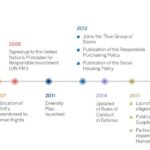BBVA’s human-rights practices, ranked among the industry’s best
BBVA’s practices in support of human rights have been assessed and recognized as one of world’s best in ‘The BankTrack Human Rights Benchmark 2019’ a industry benchmark report published Banktrack. BBVA’s overall mark - 7.5 points, after improving 4 points with respect to the 2016 edition, the highest increase by any of the 50 banks analyzed – placed the bank fourth in list released by the NGO, behind ABN AMRO and Rabobank (Netherlands) and Australia's ANZ.

For BBVA, being included in the group of front runners in Banktrack’s ranking is a remarkable achievement, especially now that the world is gearing up to celebrate Human Rights Day on December 10. The final 7.5 point mark is a solid result that secured BBVA the fourth spot in the benchmark’s top 50 bank list.
To draw up the report, the NGO uses 14 parameters to measure the four following aspects of banks’ implementation of the UN Guiding Principles on Business and Human Rights: Adoption of a policy committed to human rights, execution of a due diligence process, release of public information and remediation of potential negative impacts of the financial institution’s activity in terms of human rights.
The Group earned the highest score in the parameters measuring the implementation of policies on human rights matters and their overall scope. BBVA’s Commitment to Human Rights is a specific and global policy that engages all of the Group’s stakeholders – employees, suppliers, customers and society at large.
On the other hand, Banktrack’s report underscores BBVA’s due diligence efforts, aimed at measuring how companies take ownership over the environmental and societal effects of their activity.
These results build on the Due Diligence process launched by BBVA in 2017 to identify and assess these impacts. The process concluded with the release of the Action Plan on Human Rights 2018-2020, detailing the elements identified by the bank to prevent, mitigate and remedy potential and actual risks.
Spain
BBVA’s initiatives in support of human rights have also become a benchmark in Spain’s corporate world. Fundación Cideal praised the Group’s approach to the due diligence process, naming it among the country’s seven leading organizations on this matter, alongside Repsol, Seitsa, Endesa, Enagás, AENA and the Spanish Network of the Global Compact in its ‘Guide for the implementation of human rights due diligence processes in companies’. This document reviewed how these companies have weaved human rights into their corporate structures, by means of a series of procedures intended to identify, prevent, mitigate and explain the actual and potential risks of their activities.

Human Rights Action Plan 2018-2020.
These mentions stand as a recognition of BBVA’s long standing commitment to human rights, materialized more than 15 years ago, in 2002, with the publication of its Code of Conduct. Over time, the document, which also included references to the Universal Declaration of Human Rights, evolved into BBVA’s Commitment to Human Rights, a clearer and more specific document setting out BBVA’s policies on the matter that the bank published in 2007 and updated in 2018.
BBVA’s strong commitment to human rights is reflected in other milestones such as the publication in 2005 of the first Defense Industry Standard (with a notable impact in human rights) or the publication of its sector-specific standards. Also, BBVA became the first Spanish organization to join leading global initiatives in support of human rights, such as the UN Global Compact (UNGC), the Equator Principles or the UN Principles for Responsible Investment (PRI).
About Banktrack
Banktrack is a non-profit organization that tracks the global financial sector (multilateral and domestic development banks, foreign trade credit agencies, private and institutional investors, etc.) and the activities they finance. BankTrack relies on direct action and research to achieve its goal.
About Cideal
Cideal is an independent foundation that started working in the field of development cooperation since 1983. Based in Madrid, the foundation is also present in Latin America, the Caribbean, Africa, Asia and the Middle East.